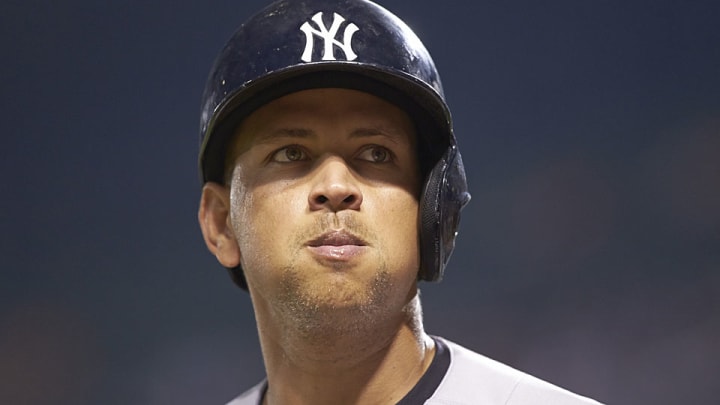Latest revelations another blow to Alex Rodriguez's PED-tainted career

Alex Rodriguez was only 31 years old in February of 2007 but his body needed help producing testosterone, according to a excerpt on SI.com of Blood Sport: Alex Rodriguez, Biogenesis and the Quest to End Baseball’s Steroid Era. It also happened to be the year Rodriguez could opt out of his contract with the Yankees and hit the free agent market after the season.
So Rodriguez asked the independent program administrator of the Joint Drug Agreement – a physician chosen by the players' association and MLB -- to grant him a medical waiver to use testosterone. Two days before spring training, he received the waiver, known as a Therapeutic Use Exemption.
It has long been established that Rodriguez has been a PED abuser and that his baseball career has been inauthentic. But the latest revelation adds to the extent of Rodriguez’s PED use.
Rodriguez, according to the excerpt, was one of only two players in 2007 to get a TUE for testosterone, which falls under the category of “androgen deficiency medications.” As MLB chief operating officer Rob Manfred testified in Rodriguez’s 2013 grievance procedure, as quoted in the excerpt, such exemptions for a “healthy, young male” are “most likely” caused by “prior steroid abuse.” The inference is that Rodriguez had been using so many steroids for so many years that his body no longer produced enough testosterone on its own.
What was the result of Rodriguez getting a green light to use an otherwise banned substance in 2007? That season he produced 156 RBIs, a .422 on-base percentage, a .645 slugging percentage, a 176 adjusted OPS and 143 runs – all numbers he never reached before or since. Only Lou Gehrig ever drove in more runs in his age-31 season.
Armed with career numbers, Rodriguez announced during Boston’s clinching win of the 2007 World Series that he was opting out of his contract. The Yankees eventually gave him $275 million over 10 years to stay.
Exclusive Excerpt: How MLB let A-Rod use PEDs during '07 season
It’s unclear whether the Yankees knew at the time that Rodriguez was playing with the help of testosterone. New York general manager Brian Cashman declined comment, noting that he hasn’t spoken about Rodriguez all year. Under standard Joint Drug Agreement protocols, a club is not informed about individual TUEs. A player may share such information with the club if he chooses.
Major League Baseball issued a statement that in part said, “All decisions regarding whether a player shall receive a therapeutic use exemption (TUE) under the Joint Drug Program are made by the Independent Program Administrator (IPA) in consultation with outside medical experts, with no input by either the Office of the Commissioner or the Players Association. The process is confidentially administered by the IPA, and MLB and the MLBPA are not even made aware of which players applied for TUEs.”
TUEs for testosterone deficiency are given “heightened scrutiny, as you would imagine,” according to a baseball source familiar with JDA protocols. Only one to three such TUEs are granted annually. That Rodriguez was able to obtain one in 2007 speaks to the medical evidence about his condition that he presented to the independent program administrator, Bryan W. Smith, a North Carolina physician. According to the book, Rodriguez obtained a different TUE in 2008, this one for clomiphene citrate, a banned fertility drug for women that also is used by men to jumpstart testosterone production, especially after steroid cycles.
The book adds another brick to the monument of PED use that is Rodriguez’s career. So far he has been connected to PEDs or those who dispensed them in at least nine of the 12 seasons between 2001-12, the years when he won his three MVP Awards and five home run titles. This is what has been established so far about Rodriguez’s connection to PEDs on a year-by-year basis:
2001: Admitted steroid use
2002: Admitted steroid use
2003: Admitted steroid use; failed drug test
2007: Therapeutic use exemption for testosterone
2008: Therapeutic use exemption for clomiphene citrate (another banned drug to address testosterone deficiency)
2009: Treated by Anthony Galea, Canadian doctor arrested for bringing HGH into U.S.
2010-12: Treated by Anthony Bosch, Biogenesis director
The book uses testimony from Rodriguez’s grievance hearing last year to establish some of the new additions to his drug timeline. Rodriguez was originally suspended last August by commissioner Bud Selig for 211 games for his role in the Biogenesis scandal – the 49 games remaining in the 2013 season and all of 2014. Rodriguez was the only one of 14 players disciplined in the case to file a grievance. He was allowed to play while the grievance was pending. Arbitrator Frederic Horwitz ultimately ruled against Rodriguez. Horwitz let the ban for 2014 stand, technically reducing the penalty to 162 games. Rodriguez’s decision to fight the ban has proved costly in more ways than just legal fees.

Tom Verducci is a senior writer for Sports Illustrated who has covered Major League Baseball since 1981. He also serves as an analyst for FOX Sports and the MLB Network; is a New York Times best-selling author; and cohosts The Book of Joe podcast with Joe Maddon. A five-time Emmy Award winner across three categories (studio analyst, reporter, short form writing) and nominated in a fourth (game analyst), he is a three-time National Sportswriter of the Year winner, two-time National Magazine Award finalist, and a Penn State Distinguished Alumnus Award recipient. Verducci is a member of the National Sports Media Hall of Fame, Baseball Writers Association of America (including past New York chapter chairman) and a Baseball Hall of Fame voter since 1993. He also is the only writer to be a game analyst for World Series telecasts. He lives in New Jersey with his wife, with whom he has two children.